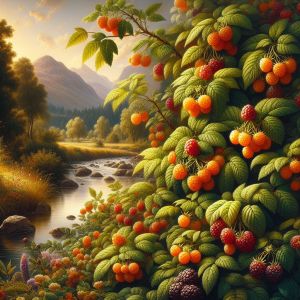Aracberry: Difference between revisions
(Created page with "{| class="{{{class}}}" style="width: 20%; margin: auto; border: 1px solid #AAA; background-color: #fac097; float: right;" | {| style="width: 99.75%; border: 1px solid #AAA; fo...") |
FablesAdmin (talk | contribs) No edit summary |
||
| (One intermediate revision by one other user not shown) | |||
| Line 1: | Line 1: | ||
{{Botany | |||
|Image = AracBerry.jpg | |||
|BotName = Bacca Auran | |||
|Nickname = Aracberry | |||
|Category = Berry | |||
|Rarity = Mundane | |||
|Class = Indigenous | |||
| | |Fruition = Year Round | ||
| | }} | ||
| | |||
| | |||
| | |||
== | ==Introduction== | ||
Aracberries | Aracberries like to grow in light forests or on the edges and clearings in dark forests. They are quite sensitive to light and are often found near springs and other small bodies of water due to their extreme water consumption. | ||
== | ==Description== | ||
Aracberries | Aracberries tend to be orange, ranging from light orange to dark orange, and have a raspberry-like shape. They grow on taller bushes, which have star-shaped leaves. The berries taste bitter-sweet, and the leaves have a slightly sugary taste. The Aracberry is, among herbalists and medics, often used as an extremely mild antidepressant due to the fruit containing minor amounts of Fluvoxamine and Paroxetine. By others, it's far more commonly used as a general painkiller. Its leaves are star-shaped and are often quite silky to the touch. It is well-known that the leaves of the Aracberry are sweet and often used for teas. | ||
== Usage == | == Usage == | ||
*'''The Berries''' | |||
::The containing slightly larger amounts of Diclofenac enables the berry to be used as the latter. While all these have a quite useful effect, the fruit also triggers dopamine release into the eating one's bloodstream. This causes most consumers to feel light-headed and giggle uncontrollably, though everyone will react slightly differently upon consumption. | |||
*'''The Leaves''' | |||
The Aracberry | ::The star-shaped leaves of the Aracberry are sweet and are mostly used for a de-stressing tea to lift moods, with a somewhat similar taste to black tea. | ||
*'''The Roots''' | |||
::Only a few herbalists know of the usefulness of the plant's roots: When crushed into powder and mixed into the above-mentioned tea, the roots will amplify the effect of the leaves. The consumer starts to feel anxiety and stress easing away far more quickly. | |||
Latest revision as of 19:02, 2 June 2024
| Botanical Name | Bacca Auran |
| Nickname | Aracberry |
| Category | Berry |
| Rarity | Mundane |
| Class | Indigenous |
| Fruition | Year Round |
Introduction
Aracberries like to grow in light forests or on the edges and clearings in dark forests. They are quite sensitive to light and are often found near springs and other small bodies of water due to their extreme water consumption.
Description
Aracberries tend to be orange, ranging from light orange to dark orange, and have a raspberry-like shape. They grow on taller bushes, which have star-shaped leaves. The berries taste bitter-sweet, and the leaves have a slightly sugary taste. The Aracberry is, among herbalists and medics, often used as an extremely mild antidepressant due to the fruit containing minor amounts of Fluvoxamine and Paroxetine. By others, it's far more commonly used as a general painkiller. Its leaves are star-shaped and are often quite silky to the touch. It is well-known that the leaves of the Aracberry are sweet and often used for teas.
Usage
- The Berries
- The containing slightly larger amounts of Diclofenac enables the berry to be used as the latter. While all these have a quite useful effect, the fruit also triggers dopamine release into the eating one's bloodstream. This causes most consumers to feel light-headed and giggle uncontrollably, though everyone will react slightly differently upon consumption.
- The Leaves
- The star-shaped leaves of the Aracberry are sweet and are mostly used for a de-stressing tea to lift moods, with a somewhat similar taste to black tea.
- The Roots
- Only a few herbalists know of the usefulness of the plant's roots: When crushed into powder and mixed into the above-mentioned tea, the roots will amplify the effect of the leaves. The consumer starts to feel anxiety and stress easing away far more quickly.
